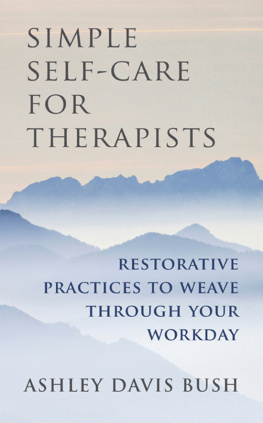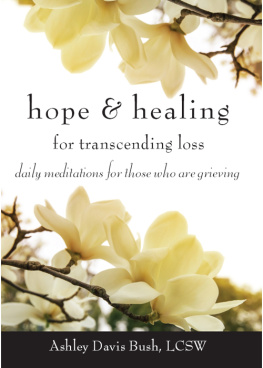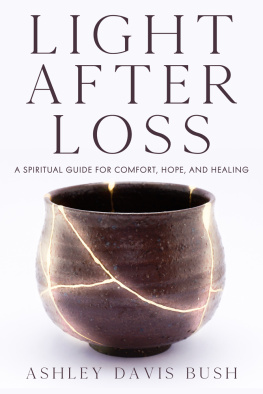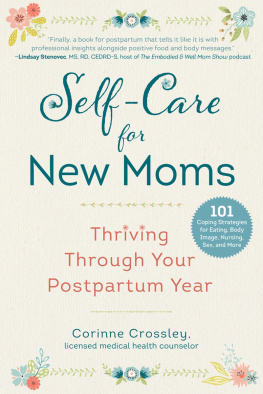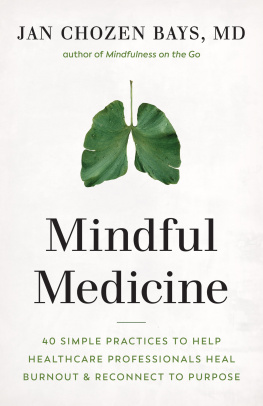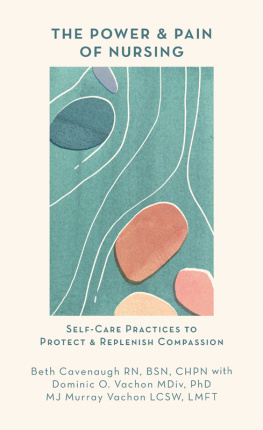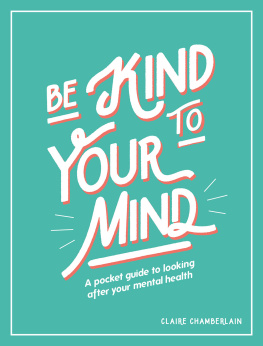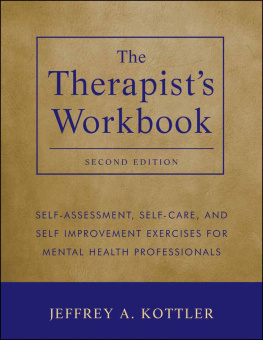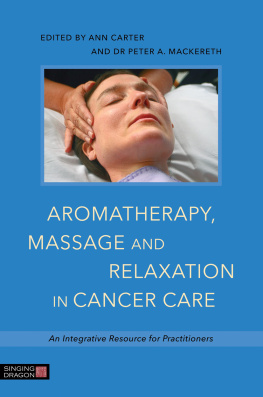
Copyright 2015 by Ashley Davis Bush
All rights reserved
First Edition
For information about permission to reproduce selections from this book, write to Permissions, W. W. Norton & Company, Inc., 500 Fifth Avenue, New York, NY 10110
For information about special discounts for bulk purchases, please contact
W. W. Norton
Special Sales at specialsales@wwnorton.com or 800-233-4830
Production manager: Chris Critelli
The Library of Congress has cataloged the printed edition as follows:
Bush, Ashley Davis.
Simple self-care for therapists : restorative practices to weave
through your workday / Ashley Davis Bush.First edition.
pages cm.(A Norton professional book)
Includes bibliographical references and index.
ISBN 978-0-393-70837-0 (hardcover)
1. PsychotherapistsJob stress. 2. PsychotherapistsMental health.
3. Burn out (Psychology)Prevention. I. Title.
RC451.4.P79B876 2015
616.89'14092dc23
2014044265
ISBN: 9780-393-70838-7 (ebook)
W. W. Norton & Company, Inc., 500 Fifth Avenue, New York, N.Y. 10110
www.wwnorton.com
W. W. Norton & Company Ltd., Castle House, 75/76 Wells Street, London
W1T 3QT
FIRST AND FOREMOST, I extend my deepest gratitude to Andrea Costella Dawson at W.W. Norton. I can say that this book literally would not be in the world if it had not been for her vision and initial enthusiasm. I thank the entire W.W.Norton team, including Ben Yarling and Kathryn Moyer, for their skill in bringing this book to life.
I am also delighted to thank my amazing literary agent, John Willig. I am indeed fortunate to have such a skilled veteran in the publishing industry in my corner. John is a pro and an all round great guy.
I have been fortunate to chat either in person or on the phone with many superb therapists who shared their ideas, challenges, practices, and struggles with me. Thank you, thank you, thank you.
I thank my colleagues who keep me on track personally and professionally: Nancy Webb, Candace Wheeler, Sue Mautz, Claire Houston, Lesley Zarat, and Denise Lamothe.
As for my family, I am deeply honored to have been supported and loved by my mother, Peyton Lewis and my father, William P. Davis for over 50 years now. I thank my five children, who I hope will spend their lives perfecting the art of self-care: Elizabeth, Channing, Setse, Victoria, and Inle.
And, saving the best for last, I thank my adored and cherished husband Daniel. Daniel is my collaborator, first editor, colleague, best friend, soul mate, true love, and rock. Daniel not only cares for me but also encourages my own self-care. He helps me to be my best self and do my best work in the world.
SIMPLE
SELF-CARE
FOR
THERAPISTS
RESTORATIVE PRACTICES
TO WEAVE THROUGH YOUR WORKDAY
ASHLEY DAVIS BUSH

W. W. NORTON & COMPANY
NEW YORK | LONDON
A NORTON PROFESSIONAL BOOK
A GUEST on my online talk radio program, Embracing Change, was telling me about her Word of the Year program. A life coach, she was describing a practice in which she selects a single word to be her guiding compass for the year.
This spin on the New Years resolution was sure to be far easier and more effective than a hokey January promise, long forgotten by February. When your word finds you, she proclaims, you spend the year living into it, absorbing it, and watching it transform your life.
So give me an example, I prompted, of how a word can reshape your life. What was your word last year?
Self-care, she proclaimed.
Amazing, I thought. Self-care, of course, had been my mantra as I researched, developed, and wrote this book. I was curious how self-care had changed her. What did you discover about your life? I probed.
With authentic enthusiasm she answered, I always thought I was kind of good at self-care, but I realized last year that I really needed to take it up a notch. I began to make it a priority, to schedule it and make it happen. Now, its completely second nature.
And has this shift improved your life?
Not only has it improved my life, she gushed, but it has improved my husbands life, my kids lives, and my clients lives. When I was depleted, I was no good to anyone, really. When I intentionally took care of myself, I had tons more to share.
Perfect. She was a walking advertisement for what I was preaching. When you feel better, the people around you also feel better. Everybody wins.
SO WHAT IS SELF-CARE ANYWAY?
What comes to mind when you think of self-care? Do you imagine a hot bath, good book, or morsel of imported chocolate? Do you see a fishing pole, beach, or forest trail? Do you conjure the image of a couch in front of a television, massage table, or a seat at the fifty-yard line? Do you envision vitamins, a treadmill, a meditation cushion, or dental floss?
Obviously, the idea of self-care is multi-layered and highly individual. What might be heaven for you (cooking a gourmet dinner) could easily be my hell. And while I might love doing jigsaw puzzles, they give you a headache. There are those who swear by gratitude practices and those who wouldnt go a day without a quiet walk. Still, I think we can agree that there are certain common denominators in the art of self-care.
At the core, self-care practices are the activities that make and keep us healthy and happy. They may be preventative, protective, or curative. They all involve nurturing the self and at their best are the seeds for growing self-compassion. To unpack the idea of self-care, Id like to clarify the difference again between macro- and micro-self-care that I described in the Introduction. Macro-self-care is the traditional stuff that we do for rest, relaxation, entertainment, fitness, and rejuvenation. These big activities, as you know, also take larger chunks of time and resources. And sometimes they might feel separate from, rather than integrated into, our daily lives.
Micro-self-care practices, the simple daily tasks that we can do to nurture, protect, and heal ourselves during our regular days, have the integrative capacity to improve our mood, decrease our emotional reactivity, and increase our mind-body awareness. Still, macro-self-care is an important component of the therapists self-care protocol. Therefore, before we examine micro-self-care practices, the primary focus of this book, Id like to invite you to reflect briefly with me on the role of larger scale self-care practices in your life. I categorize the three primary dimensions of macro-self-care as healthcare, balance, and treats.
SELF-CARE AS HEALTH CARE
Ive heard it said that health is wealth. And its true that when we feel physically healthy, everything seems easier. Alternately, when we feel physically compromised, life is a struggle. Shawn Talbot, a nutritional biochemist, uses the term vigor to refer to the sustained mood state of physical, emotional and mental maximum energy (2011). He points out that vigor is best maintained with sufficient sleep, effective exercise, and healthy nutrition. Using his template, Im going to skim the surface of the basics for consideration.
Sleep
Being an avid nine-hour a night sleeper, sleep deprivation for me is essentially torture. As therapists, our wide-eyed attention and clarity of awareness is essential to the work we do with our clients. You wouldnt intentionally show up for your clients drunk or in a similarly compromised state. Sleep deprivation stresses our ability to think clearly, stay present and, literally, stay awake. According to the 2009 Sleep in America Poll conducted by the National Sleep Foundation, people who report too little sleep also report being less able to perform daytime basics such as efficient work, exercise, healthy eating, sex, and leisure activities.
Next page
